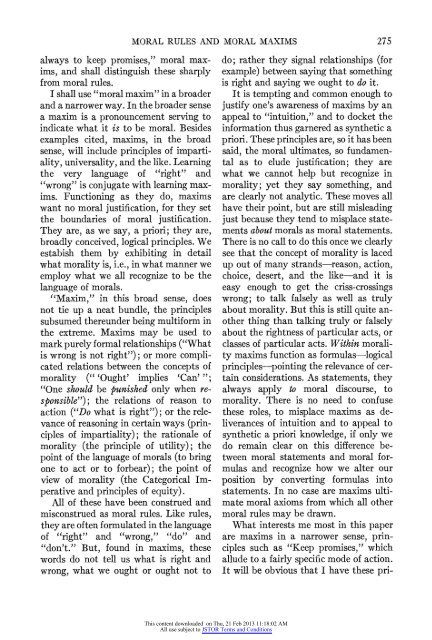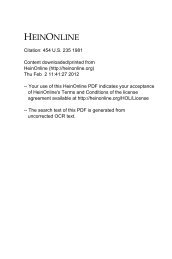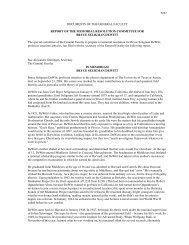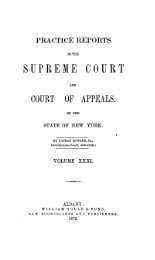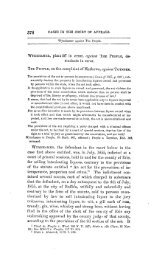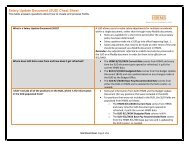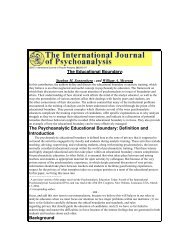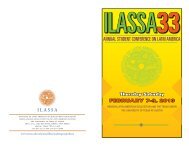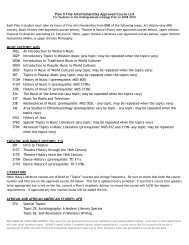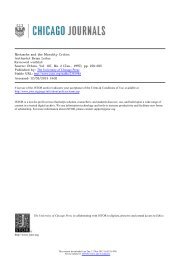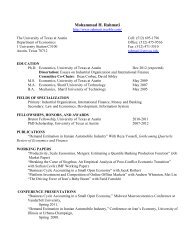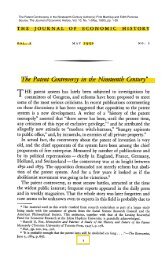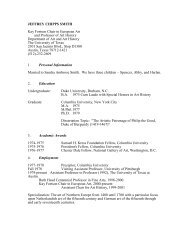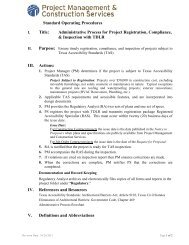Moral Rules and Moral Maxims - The University of Texas at Austin
Moral Rules and Moral Maxims - The University of Texas at Austin
Moral Rules and Moral Maxims - The University of Texas at Austin
Create successful ePaper yourself
Turn your PDF publications into a flip-book with our unique Google optimized e-Paper software.
always to keep promises," moral maxims,<strong>and</strong> shall distinguish these sharplyfrom moral rules.I shall use "moral maxim" in a broader<strong>and</strong> a narrower way. In the broader sensea maxim is a pronouncement serving toindic<strong>at</strong>e wh<strong>at</strong> it is to be moral. Besidesexamples cited, maxims, in the broadsense, will include principles <strong>of</strong> impartiality,universality, <strong>and</strong> the like. Learningthe very language <strong>of</strong> "right" <strong>and</strong>"wrong" is conjug<strong>at</strong>e with learning maxims.Functioning as they do, maximswant no moral justific<strong>at</strong>ion, for they setthe boundaries <strong>of</strong> moral justific<strong>at</strong>ion.<strong>The</strong>y are, as we say, a priori; they are,broadly conceived, logical principles. Weestabish them by exhibiting in detailwh<strong>at</strong> morality is, i.e., in wh<strong>at</strong> manner weemploy wh<strong>at</strong> we all recognize to be thelanguage <strong>of</strong> morals."Maxim," in this broad sense, doesnot tie up a ne<strong>at</strong> bundle, the principlessubsumed thereunder being multiform inthe extreme. <strong>Maxims</strong> may be used tomark purely formal rel<strong>at</strong>ionships ("Wh<strong>at</strong>is wrong is not right"); or more complic<strong>at</strong>edrel<strong>at</strong>ions between the concepts <strong>of</strong>morality (" 'Ought' implies 'Can' ";"One should be punished only when responsible");the rel<strong>at</strong>ions <strong>of</strong> reason toaction ("Do wh<strong>at</strong> is right"); or the relevance<strong>of</strong> reasoning in certain ways (principles<strong>of</strong> impartiality); the r<strong>at</strong>ionale <strong>of</strong>morality (the principle <strong>of</strong> utility); thepoint <strong>of</strong> the language <strong>of</strong> morals (to bringone to act or to forbear); the point <strong>of</strong>view <strong>of</strong> morality (the C<strong>at</strong>egorical Imper<strong>at</strong>ive<strong>and</strong> principles <strong>of</strong> equity).All <strong>of</strong> these have been construed <strong>and</strong>misconstrued as moral rules. Like rules,they are <strong>of</strong>ten formul<strong>at</strong>ed in the language<strong>of</strong> "right" <strong>and</strong> "wrong," "do" <strong>and</strong>"don't." But, found in maxims, thesewords do not tell us wh<strong>at</strong> is right <strong>and</strong>wrong, wh<strong>at</strong> we ought or ought not toMORAL RULES AND MORAL MAXIMS 275do; r<strong>at</strong>her they signal rel<strong>at</strong>ionships (forexample) between saying th<strong>at</strong> somethingis right <strong>and</strong> saying we ought to do it.It is tempting <strong>and</strong> common enough tojustify one's awareness <strong>of</strong> maxims by anappeal to "intuition," <strong>and</strong> to docket theinform<strong>at</strong>ion thus garnered as synthetic apriori. <strong>The</strong>se principles are, so it has beensaid, the moral ultim<strong>at</strong>es, so fundamentalas to elude justific<strong>at</strong>ion; they arewh<strong>at</strong> we cannot help but recognize inmorality; yet they say something, <strong>and</strong>are clearly not analytic. <strong>The</strong>se moves allhave their point, but are still misleadingjust because they tend to misplace st<strong>at</strong>ementsabout morals as moral st<strong>at</strong>ements.<strong>The</strong>re is no call to do this once we clearlysee th<strong>at</strong> the concept <strong>of</strong> morality is lacedup out <strong>of</strong> many str<strong>and</strong>s-reason, action,choice, desert, <strong>and</strong> the like-<strong>and</strong> it iseasy enough to get the criss-crossingswrong; to talk falsely as well as trulyabout morality. But this is still quite anotherthing than talking truly or falselyabout the rightness <strong>of</strong> particular acts, orclasses <strong>of</strong> particular acts. Within moralitymaxims function as formulas-logicalprinciples-pointing the relevance <strong>of</strong> certainconsider<strong>at</strong>ions. As st<strong>at</strong>ements, theyalways apply to moral discourse, tomorality. <strong>The</strong>re is no need to confusethese roles, to misplace maxims as deliverances<strong>of</strong> intuition <strong>and</strong> to appeal tosynthetic a priori knowledge, if only wedo remain clear on this difference betweenmoral st<strong>at</strong>ements <strong>and</strong> moral formulas<strong>and</strong> recognize how we alter ourposition by converting formulas intost<strong>at</strong>ements. In no case are maxims ultim<strong>at</strong>emoral axioms from which all othermoral rules may be drawn.Wh<strong>at</strong> interests me most in this paperare maxims in a narrower sense, principlessuch as "Keep promises," whichallude to a fairly specific mode <strong>of</strong> action.It will be obvious th<strong>at</strong> I have these pri-This content downloaded on Thu, 21 Feb 2013 11:18:02 AMAll use subject to JSTOR Terms <strong>and</strong> Conditions


